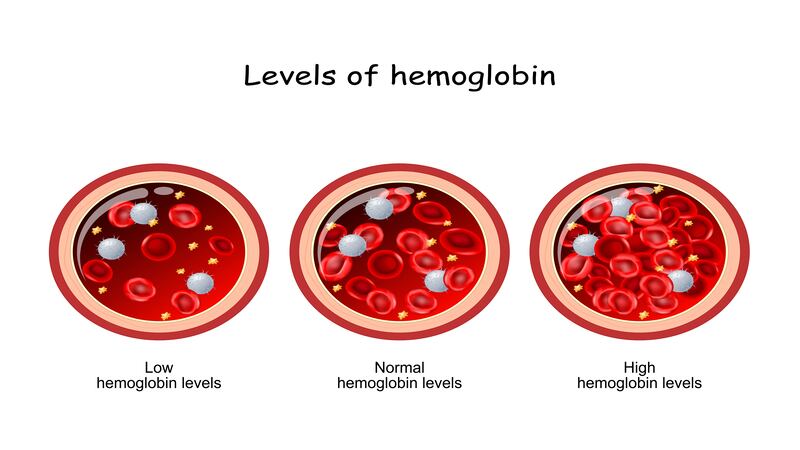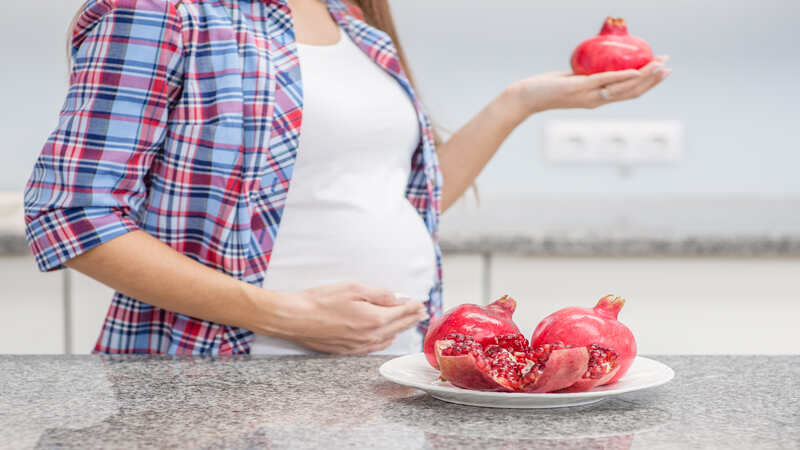 Fatigue during pregnancy is an extremely common sign. It gets quite tricky sometimes to differentiate whether tiredness is due to any other cause. Many expectant women blame their surging hormones for this but keep in mind that this sluggishness can be due to your low hemoglobin levels during pregnancy.
Fatigue during pregnancy is an extremely common sign. It gets quite tricky sometimes to differentiate whether tiredness is due to any other cause. Many expectant women blame their surging hormones for this but keep in mind that this sluggishness can be due to your low hemoglobin levels during pregnancy.
Pregnant women are often at a high risk of developing anemia, especially in the second or third trimester. Do not stress over this situation if your hemoglobin levels come out to be low, as it is quite manageable with a good diet and nutritional supplements.
What is Hemoglobin?
When we breathe in, hemoglobin, the protein seen in a red blood cell, carries oxygen from the lungs to the body tissues. Similarly, this protein carries carbon dioxide from the tissues to the lungs in the process of breathing out [1]. The main component of RBC is the iron molecule. Hence, the name (heme = iron; globulin = name of the protein). These iron molecules help carry the oxygen in the blood [2].
The level of hemoglobin is calculated in g/dl (gram per deciliter). The normal value of hemoglobin level in women ranges between 12.3 and 15.3 g/dl [3].
Importance of Hemoglobin Levels During Pregnancy
 It is a usual practice to estimate the hemoglobin level as soon as the pregnancy is confirmed. This shows the significance of hemoglobin levels during gestation. The body of a pregnant woman requires more oxygen, and the oxygen-carrying capacity of the blood is proportional to the circulating hemoglobin concentration. There is a tremendous increase in the iron requirement too [4].
It is a usual practice to estimate the hemoglobin level as soon as the pregnancy is confirmed. This shows the significance of hemoglobin levels during gestation. The body of a pregnant woman requires more oxygen, and the oxygen-carrying capacity of the blood is proportional to the circulating hemoglobin concentration. There is a tremendous increase in the iron requirement too [4].
Why Do Hemoglobin Levels Drop During Pregnancy?
It is quite normal for hemoglobin levels to fall during pregnancy. This is because the blood volume increases by 50% in the course of pregnancy to provide essential nutrients for the developing baby [5]. It starts to increase around the 8th week of pregnancy. The increase in plasma volume is higher when compared to the increase in RBC (red blood cells increase by 20%) volume. This naturally decreases the concentration of RBC in the blood, bringing down hemoglobin levels [6].
Effects of Low Hemoglobin Level During Pregnancy?
 Lower levels of hemoglobin, below 10 g/dl, can cause several health issues in the mother and baby. If an iron supplement is not taken properly as directed by the doctor, the low hemoglobin level can cause:
Lower levels of hemoglobin, below 10 g/dl, can cause several health issues in the mother and baby. If an iron supplement is not taken properly as directed by the doctor, the low hemoglobin level can cause:
- Extreme fatigue [7].
- Dizziness
- Pale lips and skin
- Brittle nails [8]
- Shortness of breath at rest
- Increased heart rate
- Hands and feet feel cold
The symptoms get worse as the hemoglobin levels fall further. When the hemoglobin level falls below 6 g/dl, the expecting mother may experience angina, a condition characterized by severe pain in the chest that moves to the shoulders, arms, and neck due to an insufficient blood supply to the heart [9].
[Read: Anemia During Pregnancy]
Am I At Risk of Decreased Hemoglobin Levels During Pregnancy?
Mild variation in hemoglobin levels is common during pregnancy. However, starting a pregnancy with a low hemoglobin level can cause some severe issues. Your hemoglobin levels will fall significantly from the very beginning of pregnancy if:
- You tend to lose more blood during menstruation, including the last one, before getting pregnant [10].
- Your diet has insufficient iron content for quite some period before you become pregnant.
- If your body is not capable of absorbing iron properly.
- You donated blood more or less around the same time you got pregnant.
- You get pregnant within a short period after your last delivery [11].
How Can I Boost My Hemoglobin Levels During Pregnancy?
 Taking an iron supplement is necessary to maintain the level of hemoglobin if your hemoglobin level is too low during pregnancy. If the difference is relatively small, a few changes to your daily menu will help boost the hemoglobin level.
Taking an iron supplement is necessary to maintain the level of hemoglobin if your hemoglobin level is too low during pregnancy. If the difference is relatively small, a few changes to your daily menu will help boost the hemoglobin level.
Other than the increased blood volume, an inadequate intake of vitamin C, iron, folic acid, and vitamin B12 is the most widely recognized explanation behind low hemoglobin [12]. Each of these deficiencies can be amended by adding certain food items to your daily diet.
List of Foods That Boost the Levels of Hemoglobin
Including some of the following foods in your pregnancy diet will help to boost the level of hemoglobin:
- Leafy vegetables (spinach, fenugreek leaves, etc.), dry fruits (raisin, almonds, etc.), food grains (barley, millet, maize), and sesame seeds, are good sources of iron [13].
- Some kinds of chemicals, minerals, and proteins (like calcium, gluten, and caffeine) block the absorption of iron by the body, even if iron-rich food is included in the diet. If possible, limit or avoid consuming certain foods that interfere with the assimilation of iron, like Milk products (calcium-rich), Coffee and tea (caffeine-rich), Alcohol Parsley (oxalic acid), Pasta and wheat products (gluten) [14].
- Fruits like guava, kiwi, grapefruit, prunes, peaches, figs, apples, etc. are rich in iron.
- Vitamin C deficiency can bring about a drop in hemoglobin levels, as without sufficient vitamin C, the body cannot absorb iron [15]. Fruits like kiwi, oranges, raspberries, and lime are some excellent sources of vitamin C. Broccoli, tomatoes, bell peppers, and dark leafy greens are vegetables that are rich in vitamin C.
- The hemoglobin levels can fall when your body is not producing sufficient RBC. Here comes the significance of folic acid deficiency. This vitamin, which belongs to B complex vitamins, is involved in the production of RBC. Bananas, corn, sprouts, turnips, lettuce, avocado, lady finger, and seeds (sunflower seeds, flax seeds, pumpkin seeds, etc.) should be a part of your regular diet.
When Do Hemoglobin Levels Become High During Gestation?
Higher hemoglobin levels generally happen due to several underlying issues related to the heart, lungs, and kidneys. Other than that, higher hemoglobin levels (above the upper limits of normal level) in the blood can happen in the course of pregnancy when:
1. Dehydration
Decreased fluid intake can increase the hemoglobin level (falsely) during pregnancy [16]. The levels come back to normal once the expecting mothers take enough fluids.
[Read: How To Handle Dehydration During Pregnancy?]
2. Erythrocytosis
Erythrocytosis is a condition in which the number of RBCs is noticeably increased [17]. During pregnancy, if the demands of the oxygen in various tissues is not met, the body tends to produce more RBC. It can weaken the blood circulation, leading to abnormal clotting.
3. An Overdose of Iron Supplements
The abnormally increased level of iron in the bloodstream results in an increased level of hemoglobin. Therefore, never take iron pills if not suggested by your doctor.
4. Contracted Plasma Volume
Poor plasma volume expansion can give an effect of increased red blood cells.
Effects of High Hemoglobin Levels During Pregnancy
 High hemoglobin levels can be an indication of unfavorable pregnancy outcomes. As:
High hemoglobin levels can be an indication of unfavorable pregnancy outcomes. As:
- High hemoglobin levels during pregnancy increase the risk of stillbirth [18].
- The chances of LBW (low birth weight), and preterm birth also increase if the mother has a higher level of hemoglobin [19].
- High hemoglobin levels during the first and the second trimester can result in fetal SGA (small for gestational age).
- High hemoglobin levels during the second trimester can be an indication of preeclampsia [20].
- Increased blood viscosity (thickness) limits the flow of blood, thereby adversely affecting the health of both mother and baby, as only less blood will reach the placenta.
[Read: Slow Fetal Growth During Pregnancy]
How Can High Hemoglobin Levels Be Treated During Pregnancy?
Higher levels of hemoglobin can point to various underlying issues. It requires a detailed medical examination and an expert opinion from a hematologist. Close monitoring of the expecting mother is essential to prevent any unlikely complications in both the mother and the baby.
Hence, it is essential to address the situation of a low hemoglobin level during pregnancy. Taking an iron-rich diet along with iron supplements will help in boosting your energy. Untreated anemia can be risky for both you and your baby. Discuss with your healthcare provider if you are struggling with anemia.
Read Also: Fetal Anemia During Pregnancy
FAQ’s
1. What Is A Low Hemoglobin Level During Pregnancy?
A Hemoglobin level of less than 11 g/dl is considered low in a pregnant woman. This happens mostly because of an increase in blood volume during pregnancy.
2. Is A Hemoglobin Level Of 9.8 Low During Pregnancy?
Yes, a Hemoglobin level of 9.8 g/dl is low during pregnancy. You should seek guidance from your healthcare provider and start treatment to improve your hemoglobin levels.
3. How To Increase Hemoglobin Levels In Pregnancy?
You can improve your hemoglobin levels by consuming an iron-rich diet like green leafy vegetables, meat, poultry, etc. Try to add vitamin C-rich food to enhance the rate of iron absorption. Your doctor might prescribe you iron supplements too.
4. Is Hemoglobin A2 High In Pregnancy?
Generally, there is no significant change in the values of hemoglobin A2 during pregnancy. Most often, it is high in cases of Thalassemia.
References
- Dean L. Blood Groups and Red Cell Antigens [Internet]. Bethesda (MD): National Center for Biotechnology Information (US); 2005. – https://www.ncbi.nlm.nih.gov/books/NBK2263/#
- Harvard Education, Hemoglobin Synthesis – https://sickle.bwh.harvard.edu/hbsynthesis.html#
- Cleveland Clinic, Low Hemoglobin – https://my.clevelandclinic.org/health/symptoms/17705
- Allison L Fisher, Elizabeta Nemeth, Iron homeostasis during pregnancy, The American Journal of Clinical Nutrition, Volume 106, Supplement 6 – https://www.sciencedirect.com/science/article/pii/S0002916522027253
- Soma-Pillay P, Nelson-Piercy C, Tolppanen H, Mebazaa A. Physiological changes in pregnancy. Cardiovasc J Afr. 2016 – https://www.ncbi.nlm.nih.gov/pmc/articles/PMC4928162/
- The Global Academy of Women’s Medicine – https://www.glowm.com/article/heading/vol-8–maternal-medical-health-and-disorders-in-pregnancy–hematological-normal-ranges-in-pregnancy/id/413403
- Mayo Clinic, Anemia – https://www.mayoclinic.org/diseases-conditions/anemia/symptoms-causes/syc-20351360
- AMERICAN OSTEOPATHIC COLLEGE OF DERMATOLOGY, Brittle Splitting Nails – https://www.aocd.org/page/BrittleSplittingNail
- Cleveland Clinic, Angina – https://my.clevelandclinic.org/health/diseases/21489-angina#symptoms-and-causes
- Biogena, Iron deficiency due to menstrual periods – https://biogena.com/en/knowledge/guide/iron-and-menstruation_bba_82085
- Mayo Clinic, Getting pregnant – https://www.mayoclinic.org/healthy-lifestyle/getting-pregnant
- WHO, Anaemia – https://www.who.int/health-topics/anaemia
- Healthdirect, Foods high in iron – https://www.healthdirect.gov.au/foods-high-in-iron
- Moustarah F, Daley SF. Dietary Iron. [Updated 2024 Jan 8]. In: StatPearls [Internet]. Treasure Island (FL): StatPearls Publishing; 2024 Jan – https://www.ncbi.nlm.nih.gov/books/NBK540969/
- Maxfield L, Daley SF, Crane JS. Vitamin C Deficiency. [Updated 2023 Nov 12]. In: StatPearls [Internet]. Treasure Island (FL): StatPearls Publishing; 2024 Jan – https://www.ncbi.nlm.nih.gov/books/NBK493187/
- Billett HH. Hemoglobin and Hematocrit. In: Walker HK, Hall WD, Hurst JW, editors. Clinical Methods: The History, Physical, and Laboratory Examinations. 3rd edition. Boston: Butterworths; 1990. – https://www.ncbi.nlm.nih.gov/books/NBK259/
- NHS, Erythrocytosis – https://www.nhs.uk/conditions/erythrocytosis/
- Koller, O., Sandvei, R., & Sagen, N. (1980). High hemoglobin levels during pregnancy and fetal risk. International journal of gynaecology and obstetrics: the official organ of the International Federation of Gynaecology and Obstetrics – https://pubmed.ncbi.nlm.nih.gov/6106602/
- Sah SK, Sunuwar DR, Baral JR, Singh DR, Chaudhary NK, Gurung G. Maternal hemoglobin and risk of low birth weight: A hospital-based cross-sectional study in Nepal. Heliyon. 2022 – https://www.ncbi.nlm.nih.gov/pmc/articles/PMC9791333/
- Abumohsen H, Bustami B, Almusleh A, Yasin O, Farhoud A, Safarini O, Thabaleh A, Sukhon M, Nazzal Z, Damiri B. The Association Between High Hemoglobin Levels and Pregnancy Complications, Gestational Diabetes and Hypertension, Among Palestinian Women. Cureus. 2021 Oct 17 – https://www.ncbi.nlm.nih.gov/pmc/articles/PMC8594858/
